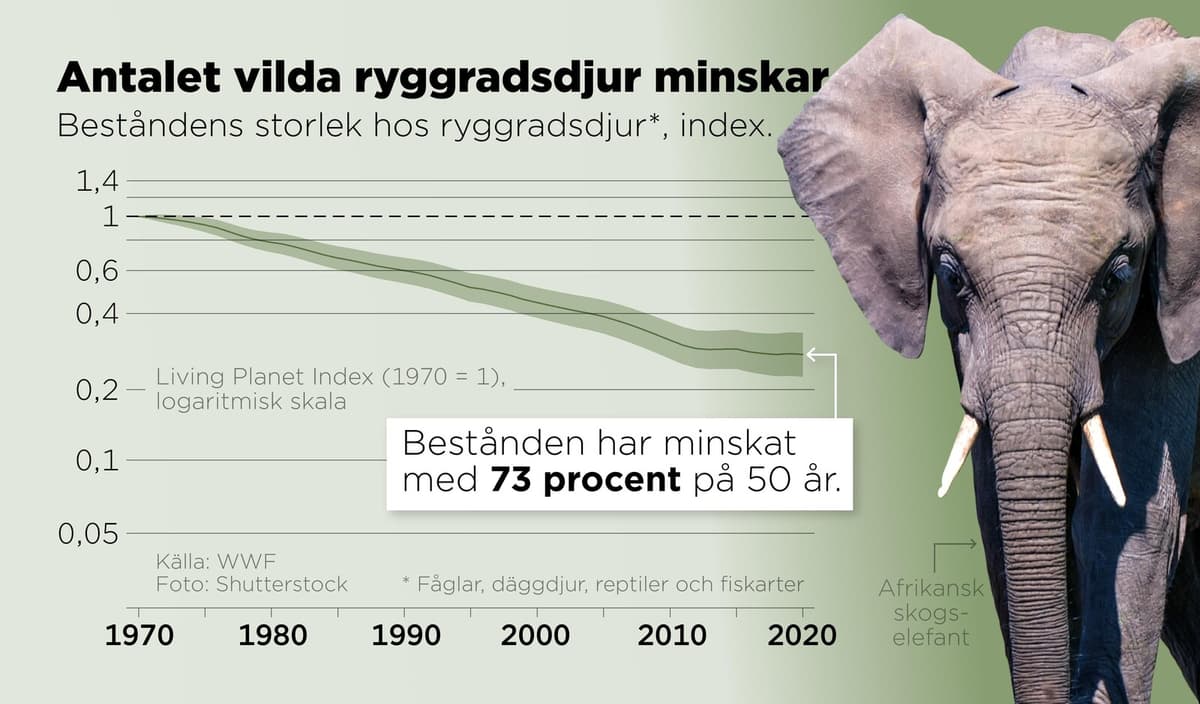WWF's Living Planet Report 2024 covers nearly 35,000 population trends of 5,495 wild vertebrates – birds, mammals, reptiles, and fish species.
The data set we use is significantly larger now than in previous years and provides a stronger picture of what is actually happening, says Olle Forshed, an expert on WWF regarding the report.
There are positive examples of vertebrates recovering and returning, such as the mountain gorillas in the Virunga Mountains in East Africa and the wisents in Central Europe.
However, between 1970 and 2020, the size of wild vertebrate populations decreased by an average of 73 percent.
If we think of a normal population as 100 animals, it's now only 27, says Olle Forshed.
Affecting Ecosystems
Vertebrates are often high up in the food chain, and when they disappear, it affects the entire ecosystem. Olle Forshed takes the African forest elephant as an example. Between 2004 and 2014, the population decreased by 78 to 81 percent.
They are natural seed dispersers and create much of the species composition in forests. When they disappear, seed dispersal suffers, and over time, it leads to forests having a different type of vegetation, which may not bind the same amount of carbon or provide the same water circulation.
When ecosystems are damaged, their ability to provide us with clean air, water, and food decreases. They also become more vulnerable to so-called tipping points, which can lead to irreversible changes. Globally, there are several examples – the Amazon is one of the most obvious.
When it becomes deforested to around 20-25 percent, the water systems do not circulate in the same way, and eventually, it will lead to many species and the entire system collapsing.
Major Effects
Such a collapse would change weather patterns and affect food production. Today, the Amazon is deforested to 17 percent. According to WWF, a staggering 95 percent of animals have disappeared in Latin America and the Caribbean, mainly due to the extinction of many amphibians.
We must avoid that tipping point. We cannot let it happen.
The destruction of animals' natural habitats, along with hunting and fishing, are the main reasons why vertebrates are decreasing.
WWF believes that food, finance, and energy systems, as well as nature conservation, must be transformed.
It is urgent to create a process for animals, nature, and humans to live together. Humans must take up less space or share the space.
The strongest decline is found in freshwater ecosystems, where vertebrate populations have decreased by 85 percent, followed by land-based ecosystems (-69 percent) and marine ecosystems (-56 percent).
Over 80 percent of all threatened bird and mammal species on land are threatened by habitat loss caused by agriculture. Other causes are overexploitation, invasive species, diseases, pollution, and climate change.
The largest declines of the studied populations are found in Latin America and the Caribbean (-95 percent), Africa (-76 percent), and the Asia-Pacific region (-60 percent).
Source: WWF






